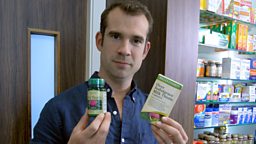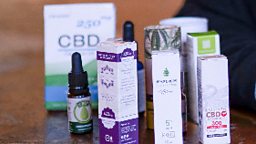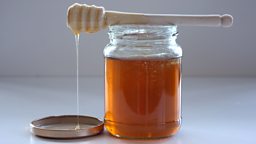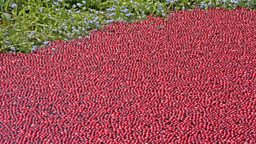Can I improve my eyesight?
Everyone worries about their eyesight – and we’re all resigned to the fact that as we get older, it’s only going to get worse. But could we actually improve our eyesight – simply through what we eat?

Long and short-sightedness are the problems that most of us think of when we think about how good our eyesight is, and those are affected by the length and shape of our eyeball and the thickness of our lens at the front. But at the back of our eyeball are all the light-sensitive cells – the retina – and the condition of this is essential to our eyesight.
A specialized part of the retina is called the macula - this part of the eye is responsible for central vision, and it is protected by a kind of natural sunscreen to prevent the sensitive vision cells from being damaged by the energy from blue or UV light. This natural sunscreen is made up of a yellowish ‘macular pigment’ – a mixture of three light-absorbing compounds; lutein, zeaxanthin and meso-zeaxanthin. Our bodies cannot make these three compounds – in fact they are made by plants to absorb light in order to carry out photosynthesis, by which they capture energy from the sun. So we get them from our diet.
Lutein and zeaxanthin are found commonly in dark green leafy veg such as kale and spinach, and also bell peppers, corn and saffron. Meso-zeaxanthin is generally not found in plants – it is thought to be made in our bodies from lutein (although it is also present in some fish, especially in their skins, so we may be able to take it in in our diet too).
These pigments, once we eat them, appear to be important in our vision and in helping keep the macula healthy.
Recent work, such as that by Professor John Nolan and his team at the Waterford Institute of Technology, south east Ireland, suggests that increasing the levels of these three compounds in our diet can improve our eyesight. So we put this to the test.
Experiment 1
Michael Mosley took supplements containing the three macular pigments every day for 12 weeks. He had his blood levels of the chemicals, the amount of macular pigments in his eyes, and his eyesight thoroughly tested before and after taking the pills.
Results
Overall, Michael showed an improvement in many aspects of his vision – but especially his perception of yellow/blue colours and his night vision), and increase in his macular pigment density and an increase in these compounds in his blood.
Blood levels of the chemicals

Macular pigment density


These results are similar to those seen in Prof Nolan’s large year-long study of around 100 volunteers, who all took the same supplementation and saw similar increases in their macular pigments and improvements in eyesight. To see them in this short a period of time, though, was a nice surprise!
Experiment 2
10 volunteers drank a daily green smoothie for 5 weeks for us, designed by Dr Elizabeth Johnston of Tufts University in the US. It was designed to include high levels of lutein and zeaxanthin to see whether it was possible to get a similar effect in the diet without taking supplements.
Recipe
Ingredients
- 125g kale, cooked
- 80ml milk, 2% with DHA
- ½ small (6”) banana
- 125g kiwi, cut pieces
- 125g pineapple, chunks, canned in water
- ½ medium apple, peeled
- ¼ cup mint leaves, fresh (for flavouring)
- 1 tbsp almond butter
- ½ tsp wheat germ oil
- ½ lime, squeezed
Method
- Add cooked kale, almond butter, wheat germ oil, and small amount of the liquid to a food processor or high-powered blender; blend until smooth paste forms.
- Add remaining ingredients (including rest of the liquid) and continue to blend until smooth.
Results
The green smoothie diet nearly doubled the volunteer’s lutein levels in their blood. Zeaxanthin levels did not increase, however, and there was not a change in the levels of macular pigments or improvements in their eyesight. This could be because these pigments take a while to get in to different tissues in the body, including the eye, so taking these foods for longer could show more of an effect. It may also be that the recipe needs tweaking to include more zeaxanthin. Supplements often contain these pigments from marigolds… but they’re not a common food!

So what should I do?
There’s good evidence now that increasing the amount of these pigment chemicals in your diet can help improve your eyesight. There is also some evidence that it may help prevent damage to your eyesight through macular degeneration. Age-related macular degeneration (AMD) is the leading cause of vision loss in the UK, and Prof Nolan’s group have seen evidence that boosting the macular pigments can help.
The question, then, is how best to get these compounds into our diet. The strongest evidence at the moment is around supplements containing all three of the macular compounds. However, many researchers believe that simply eating a diet rich in leafy green vegetables should be enough to keep your levels healthy. Be aware, though, that carrots – despite the myth that eating them will help your vision – do NOT contain particularly high levels of any of these compounds!
If you are at all worried about your vision, then do see an optometrist as soon as possible. Early intervention in the case of vision problems is key.














































































